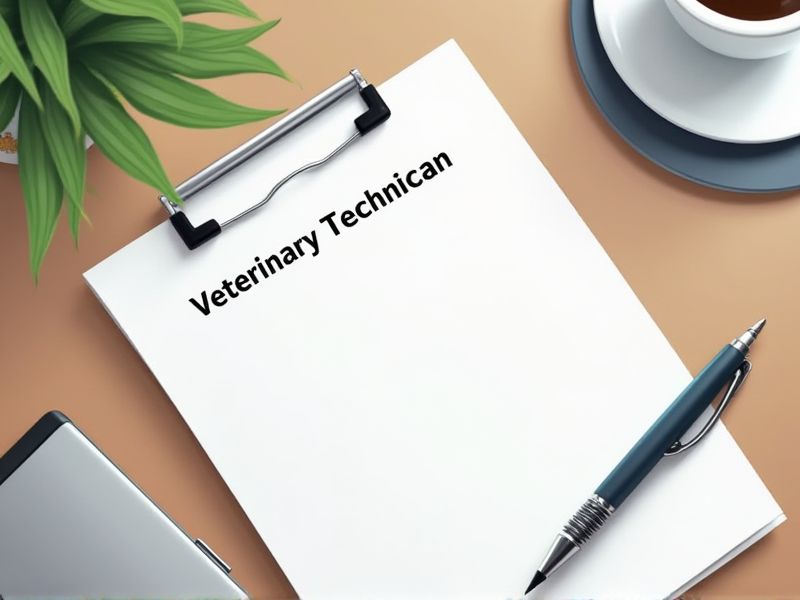
Veterinary Technicians play a critical role in animal healthcare, providing essential support to veterinarians. Due to the complexity and variety of tasks they perform, certifications validate their skills and ensure they meet industry standards. Certifications also help enhance their expertise in specialized areas, boosting their career prospects. Here are some important certifications you may need as a Veterinary Technician.
National Veterinary Technician Exam (VTNE)
The National Veterinary Technician Exam (VTNE) is essential because it standardizes the assessment of core competencies required for veterinary technicians across different states and provinces. Its existence is crucial in ensuring that certified professionals possess the necessary knowledge and skills to provide quality animal care. By passing this exam, veterinary technicians demonstrate their commitment to adhering to established industry standards. Without the VTNE, the consistency in veterinary care provided across various regions could be compromised, potentially leading to varied levels of animal health services.
State Veterinary Technician License
The state veterinary technician license ensures that individuals possess the necessary skills and education to safely and effectively assist veterinarians. Licensing establishes a standard of care, which helps protect animal patients and their owners. It also provides the public with confidence that licensed technicians adhere to professional guidelines. Without proper licensing, there could be increased risks of malpractice or harm to the animals they treat.
Certified Veterinary Technician (CVT)
Certified Veterinary Technicians enhance the quality of care animals receive due to their rigorous training and certification process. Their expertise in clinical procedures and patient management increases the efficiency of veterinary practices. Certification ensures that technicians are up-to-date with the latest advancements in veterinary medicine. Employing a CVT also instills confidence in pet owners, knowing their pets are in capable and knowledgeable hands.
Veterinary Technician Specialist - Anesthesia (VTS-A)
Veterinary Technician Specialists in Anesthesia (VTS-A) enhance patient safety by applying specialized knowledge in anesthesia protocols, minimizing risks during surgical procedures. Their expertise in monitoring anesthetic depth leads to more accurate and timely interventions, reducing the likelihood of complications. Comprehensive understanding of pharmacology allows them to effectively manage pain, contributing to faster recovery and improved patient comfort. Specialized skills in anesthesia ensure optimized workflow in veterinary practices, leading to more efficient use of resources and better outcomes.
Veterinary Technician Specialist - Dentistry (VTS-D)
The Veterinary Technician Specialist in Dentistry (VTS-D) is critical due to the increasing awareness of pet oral health, which directly affects overall well-being. Pet owners strive to prevent dental diseases, resulting in higher demand for specialized dental care in veterinary settings. VTS-D expertise ensures advanced procedures such as dental radiology and periodontal therapy are conducted accurately, improving treatment outcomes. Specialized skills of VTS-D contribute to the veterinary team's efficiency and enhance client satisfaction through targeted dental care education.
Veterinary Technician Specialist - Emergency & Critical Care (VTS-ECC)
The demand for Veterinary Technician Specialist in Emergency & Critical Care (VTS-ECC) arises due to the increasing complexity of animal medical emergencies which require specialized skill sets and knowledge. Emergency and critical care situations often need prompt, precise interventions, and a VTS-ECC is trained to respond effectively to these high-pressure scenarios. Their expertise supports veterinarians in minimizing recovery times and improving patient outcomes. The specialization also addresses the growing pet-owning population's need for advanced veterinary care options.
Veterinary Technician Specialist - Internal Medicine (VTS-IM)
The role of a Veterinary Technician Specialist in Internal Medicine (VTS-IM) is essential because it provides advanced diagnostic and treatment support for complex medical conditions in animals. Specialized skills and knowledge allow these technicians to efficiently assist veterinarians in managing chronic illnesses and intricate medical procedures. Demand for VTS-IM professionals is growing due to increased pet ownership and the rising expectation for higher standards of veterinary care. Their expertise enhances patient outcomes and contributes to the overall success of veterinary practices.
Veterinary Technician Specialist - Oncology (VTS-O)
The role of a Veterinary Technician Specialist in Oncology (VTS-O) aligns with the increasing demand for specialized care in veterinary medicine, as cancer becomes one of the leading causes of illness in pets. Such specialists possess advanced knowledge in oncology, enabling more accurate diagnostics and effective treatments for animals with cancer. Employing a VTS-O can lead to improved patient outcomes and increased client satisfaction, which strengthens veterinary practices' reputations. As veterinary practices expand their scope of services, the expertise of a VTS-O supports comprehensive care models, addressing complex cases that require dedicated oncology expertise.
Veterinary Technician Specialist - Behavior (VTS-B)
Increased awareness of animal mental health has led to a growing demand for specialized care, which VTS-B professionals provide by focusing on behavioral issues. An increased incidence of pet behavioral problems has driven the need for a veterinary technician with expertise in behavior, ensuring proper diagnosis and treatment plans. Veterinary settings benefit from a VTS-B, as they are trained to improve patient outcomes by mitigating stress-related complications. The specialization in behavior enhances client education, fostering stronger bonds between pet owners and their animals, and decreasing the likelihood of pet abandonment.
Certified Animal Welfare Administrator (CAWA)
Having a Certified Animal Welfare Administrator (CAWA) ensures veterinary technicians are informed about best practices in animal welfare. This certification increases trust between clients and veterinary staff, as it signifies a commitment to ethical animal care. CAWAs bring specialized training that helps veterinary technicians navigate complex welfare issues. As public concern for animal rights grows, having CAWAs integrated into veterinary practices aligns with societal expectations and legal standards.
Summary
By obtaining additional certifications, your skills as a Veterinary Technician will be recognized and enhanced, leading to increased professional opportunities. Specialization in areas like anesthesia, dentistry, or nutrition can make you more attractive to employers, who may offer higher salaries and better job positions. Expertise in niche fields often allows you to provide more comprehensive care to animals, improving patient outcomes. Certified technicians also tend to have greater job satisfaction due to expanded roles and responsibilities.
